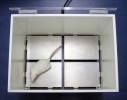Authors
P Asthana, N Zhang, G Kumar, V Bhagawan Chine, K Kumar Singh, Y Ling Mak, L Lai Chan, P Kwan Sing Lam, C Him Eddie Ma
Lab
Department of Biomedical SciencesCity University of Hong KongHong KongHong Kong
Journal
Molecular Neurobiology
Abstract
Consumption of fish containing ciguatera toxins or ciguatoxins (CTXs) causes ciguatera fish poisoning (CFP). In some patients, CFP recurrence occurs even years after exposure related to CTXs accumulation. Pacific CTX-1 (P-CTX-1) is one of the most potent natural substances known that causes predominantly neurological symptoms in patients; however, the underlying pathogenies of CFP remain unknown. Using clinically relevant neurobehavioral tests and electromyography (EMG) to assess effects of P-CTX-1 during the 4Êmonths after exposure, recurrent motor strength deficit occurred in mice exposed to P-CTX-1. We detected irreversible motor strength deficits accompanied by reduced EMG activity, demyelination, and slowing of motor nerve conduction, whereas control unexposed mice fully recovered in 1Êmonth after peripheral nerve injury. Finally, to uncover the mechanism underlying CFP, we detected reduction of spontaneous firing rate of motor cortical neurons even 6Êmonths after exposure and increased number of glial fibrillary acidic protein (GFAP)-immunoreactive astrocytes. Increased numbers of motor cortical neuron apoptosis were detected by dUTP-digoxigenin nick end labeling assay along with activation of caspase 3. Taken together, our study demonstrates that persistence of P-CTX-1 in the nervous system induces irreversible motor deficit that correlates well with excitotoxicity and neurodegeneration detected in the motor cortical neurons.
BIOSEB Instruments Used:
Aron Test or Four Plates Test (LE830),Grip strength test (BIO-GS3),Rotarod (BX-ROD)

 Pain - Thermal Allodynia / Hyperalgesia
Pain - Thermal Allodynia / Hyperalgesia Pain - Spontaneous Pain - Postural Deficit
Pain - Spontaneous Pain - Postural Deficit Pain - Mechanical Allodynia / Hyperalgesia
Pain - Mechanical Allodynia / Hyperalgesia Learning/Memory - Attention - Addiction
Learning/Memory - Attention - Addiction Physiology & Respiratory Research
Physiology & Respiratory Research
 Pain
Pain Metabolism
Metabolism Motor control
Motor control Neurodegeneration
Neurodegeneration Cross-disciplinary subjects
Cross-disciplinary subjects Muscular system
Muscular system General activity
General activity Mood Disorders
Mood Disorders Other disorders
Other disorders Joints
Joints Central Nervous System (CNS)
Central Nervous System (CNS) Sensory system
Sensory system


